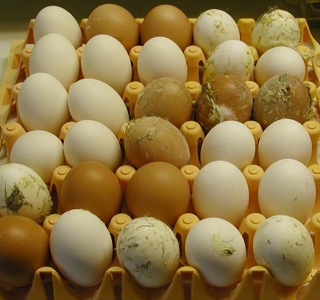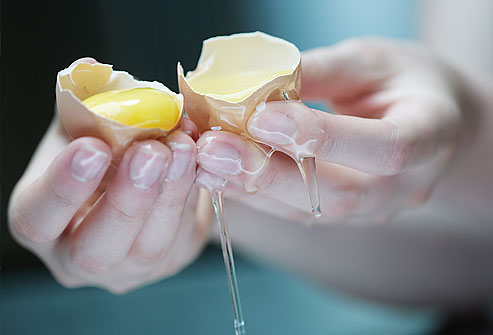Alysa Golden didn’t want to become an egg mogul. She just wanted a good egg – farm fresh, free from hormones, laid by chickens raised in a cruelty free environment.
Her quest for the perfect egg led her to a Mennonite community in Southwestern Ontario. The farm delivered them to her front door.
"The eggs were wonderful, full and thick and rich," says Golden. Two months ago Golden started ordering eggs for her east end Toronto neighbours. She leaves the eggs on her porch and her neighbours pick them up, cross their name off a clipboard and stuff a cheque in a box.
.jpg) It’s based on an honor system. And she hasn’t lost a dime.
It’s based on an honor system. And she hasn’t lost a dime.
According to the Toronto Star, Golden’s venture spoke to the untapped need of many consumers to get back to basics and to understand where their food is from at the most elemental level.
The locavore movement is not new, of course. Buying food from nearby farms makes sense, both from a health and carbon footprint standpoint, although Toronto Public Health warns consumers against purchasing eggs outside normal channels.
Many high-end restaurants exploit the farm fresh movement in their marketing. But this wasn’t about eating a fancy dinner. It was about city parents, tired of stuffing processed food into their kids, wanting to introduce their children to a "real" egg, says Golden.
Buoyed by her success, Golden started distributing eggs from her company, which she called Eggy Weggs. The other "depots" included a couple of health food stores in Toronto and most recently the popular Lazy Daisy Café in the Leslieville neighbourhood.
Chapman doesn’t make a profit off the sales. Her café is simply a pick up station. And like Golden’s home, the honor system is in effect, with egg buyers picking up their trays and crossing their name off the clipboard.
The eggs cost $6.50 per dozen, which is about a buck and a half below what comparable products might sell for, says Golden.
But Jim Chan, manager of healthy environments for Toronto Public Health, says shoppers should ask if the eggs have been graded and are legal. "Just because it says farm fresh, that’s not good enough. Everything’s farm fresh, it’s not like the guy got them out of his basement," says Chan.
Chan’s staff cracked down on egg vendors in February and March. Six vendors were notified they will be charged for having ungraded eggs. By law, eggs must be sorted, washed, and inspected to be free of leaks and cracks. Only Canada Grade A eggs are allowed for human consumption.
"If there is a hairline crack you could get salmonella or bacteria inside the shell which can lead to real health problems," says Chan.
Last February, Toronto Public Health charged six other vendors. Farm Fresh Supermarket at Sheppard Ave. E was fined $10,000 on egg-related charges.
Golden says her eggs are from farms that have their produce graded at the Green Meadow Eggs grading station in Southwestern Ontario.
An official from the Canadian Food Inspection Agency contacted by the Star said Green Meadows is a certified grader.
 – Los huevos pueden portar Salmonella y deben ser cocidos a 145°F por 15 segundos para reducir el riesgo, o hasta que la yema se endurezca.
– Los huevos pueden portar Salmonella y deben ser cocidos a 145°F por 15 segundos para reducir el riesgo, o hasta que la yema se endurezca.
.jpg) It’s based on an honor system. And she hasn’t lost a dime.
It’s based on an honor system. And she hasn’t lost a dime..jpg) For Peter Webb it was gold.
For Peter Webb it was gold. back to jail for a longer time to get the message across.”
back to jail for a longer time to get the message across.” affected more than a dozen people.
affected more than a dozen people..jpg) Despite continuous advances in food safety and disease surveillance, control, and prevention, atypical pathogenic Salmonella spp. strains that bypass existing procedures do emerge. Foodborne bacterial infections remain a major public health concern.
Despite continuous advances in food safety and disease surveillance, control, and prevention, atypical pathogenic Salmonella spp. strains that bypass existing procedures do emerge. Foodborne bacterial infections remain a major public health concern..jpg) confirmed the presence of Salmonella Enteritidis. Larry Schultz Organic Farm is cooperating with the MDA investigation and has issued a voluntary recall of the products.
confirmed the presence of Salmonella Enteritidis. Larry Schultz Organic Farm is cooperating with the MDA investigation and has issued a voluntary recall of the products..jpeg) of his Hardin County facility, defaulted on bank loans, been "blackballed" by food vendors and been barred from bidding on contracts with retailers.
of his Hardin County facility, defaulted on bank loans, been "blackballed" by food vendors and been barred from bidding on contracts with retailers. (104 cases), the West Midlands (36 cases) and the East Midlands (26 cases).
(104 cases), the West Midlands (36 cases) and the East Midlands (26 cases). and Wyandot counties. The Licking operations are expanding.
and Wyandot counties. The Licking operations are expanding.